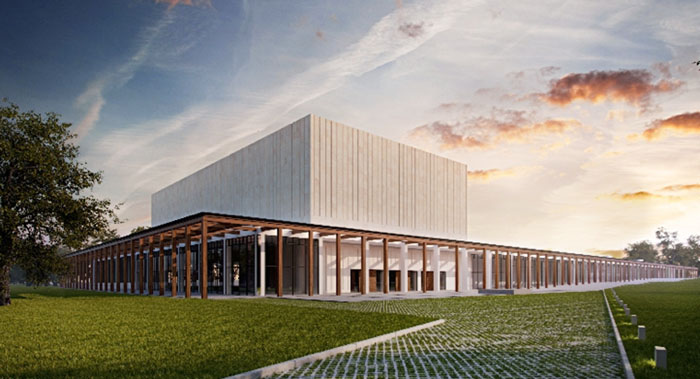
Krzysztof Penderecki European Music Centre, project visualisation, photo: press release
Anne-Sophie Mutter inaugurates the official opening of the Krzysztof Penderecki European Music Centre with a concert in Lusławice on the 21st of May. The world-famous violinist is accompanied by young instrumentalists from Poland and abroad
The composer and the initiator of the project, Krzysztof Penderecki, stated during a press conference in April:
Here, in the small town of Lusławice, an important venue has been created, which will bear a cultural influence on the entire region.
The investment, which was built in its entirety over a period of 16 months in southeast Poland, cost nearly 65 million zloty (about 15.5 million euro). 50 million of the total sum was provided by the Eurpean Union fund, as part of the Infrastructure and Environment operational programme. The remaining funding came from the Małopolska Voivodship, the Polish state budget and the Krzysztof Penedercki Akademia Association International Centre for Music, Ballet and Sports, with each contributing 5 million złoty.
The composer emphasised:
We have already began a series of concerts, and they all enjoyed a full house audience, and they raised huge interest. People from Kraków, Tarnów and the local vicinities come to the events, and we have hosted 4 thousand people to date.
According to Penderecki’s idea, the European Music Centre in the village of Lusławice is dedicated to artistically talented youth from across Europe. Instrumentalists, vocalists and conductors will be provided with a chance to polish their craft under the eye of contemporary musical masters.

Krzysztof Penderecki European Music Centre, photo: press release
The European Music Centre is shaped according to the tradition of the Lusławice School, founded in the region by the Polish Brethren at the turn of the 16th and 17th centuries. The Polish Brethren were members of the Minor Reformed Church of Poland, a Non-Trinitarian Protestant church that existed from 1565 to 1658. They were called Arians or Socinians by others, but preferred simply to be called Brethren or Christians then, after their expulsion from Poland, Unitarians.
The Lusławice School was modeled on contemporary academia and provided education in the field of teology, metaphysics, logic, dialectic, anatomy and physics. It also prepared its students for the difficult art of religious dispute, and, in the field of music, to the communal singing of chants and psalms.
The renowned painter, Jacek Malczewski, a crucial figure during the Young Poland period, also lived and worked in this area. Penderecki's home here was an abandoned manor after the Second World War, derelict and ruined. The composer purchased it in the 1970s and today it is entirely renovated, and it is both the composer’s home and his workplace. In the midst of hectares of rolling parkland and his arboretum of rare trees, it is frequently visited by Polish and international artists. Penderecki reveals:
It is actually lika a campus, and these exist throughout the world, and especially in the United States, where I travelled numerous times as a lecturer. I think that there is a great need for this kind of a place here in Poland, too.
The new Centre has been designed as a high-class multifunctional musical venue, which provides universal possibilities of development in the field of music, as well as the organisation of concerts and chamber ballet performances.
The ensemble of buildings and facilities has been raised as part of the endevour, all provided with the necessary technological infrastructure. At the heart of the Centre is a concert hall with 650 seats and the highest acoustic standards. There are also rehearsal auditoriums and spaces for ballet rehearsal.
The director of the Centre, Adam Balas, underscored that the use of natural materials such as pine and oak fulfills the most rigorous demands of international acoustic standards. Such quality concert halls are a rarity in the world, and the newly constructed one is considered among the best in the world.
Editor: Filip Lech, translated by Paulina Schlosser, 15.05.2013, source: PAP, http://penderecki-center.pl/